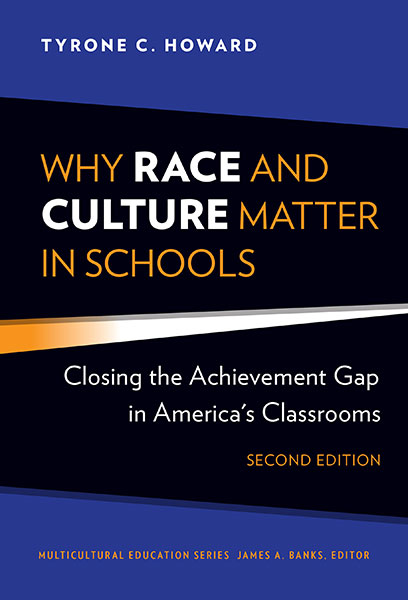Select an item by clicking its checkbox
Additional Info:
Issues tied to race and culture continue to be a part of the landscape of America’s schools and classrooms. Given the rapid demographic transformation in the nation’s states, cities, counties, and schools, it is essential that all school personnel acquire the necessary knowledge, skills, and dispositions to talk, teach, and think across racial and cultural differences. The second edition of Howard’s bestseller has been updated to take a deeper look at how schools must be prepared to respond to disparate outcomes among students of color. Tyrone Howard draws on theoretical constructs tied to race and racism, culture, and opportunity gaps to address pressing issues stemming from the chronic inequalities that remain prevalent in many schools across the country. This time-honored text will help educators at all levels respond with greater conviction and clarity on how to create more equitable, inclusive, and democratic schools as sites for teaching and learning. (From the Publisher)
Table Of Content:
Series Foreword James A. Banks
Foreword Geneva Gay
Acknowledgments
Introduction
Socioeconomic Status and School Performance
Outline of the Book
Moving Away from the Black–White Dichotomy
1. Educational outcome disparities: Contextualizing the Problem
Documenting the educational outcome disparities
Documenting the Discrepancies
Retention, Suspensions, and Expulsions
School Drop-Out and Graduation Rates
Access to Gifted and AP Courses
SAT Scores
Explaining the Gaps
Future Considerations
2. Changing Demographics
A Changing Nation
Demographic Shifts by Geographic Region and Age
U.S. Schools and Changing Demographics
Are Teachers Being Prepared to Teach in Diverse Settings?
Multicultural Education for School Reform
The Role of Social Class
3. Culture
Culture, Race, and Ethnicity
The Complexity of Culture
Sociocultural Theory
Cultural Modeling
Cultural Repertoires of Practice
Normalizing Culture in Everyday Practice
4. Culturally Responsive Pedagogy
Seeking Clarity in Culture and Pedagogy
Empirical and Conceptual Work on Culturally Responsive Pedagogy
The Importance of Pedagogy
Programs with Culturally Responsive Teaching
5. The Role of Race in Learning
Interrogating Race
Race and Education in the United States
Critical Race Theory: A Framework for Examining Race and Achievement
Empirical Works Examining Race
Granting Voice to Those Who Rarely Are Heard
Internalized Racism: Educators of Color and Acts of Exclusion
Racial Frames of Reference
6. Developing Cultural Competence and Racial Awareness in Classroom Teachers
Cultural Competence
Critical Self-Reflection on Race and Culture
Race, Culture, and the Adaptive Unconsciousness
Racial Awareness
A Case Study of Critical Reflecting: Teaching Teachers to Reflect on Race
Final Considerations
7. Examples of School Success for Culturally Diverse Students Stories of School Success
Visionary Leadership
Effective Instructional Practices
Intensive Academic Intervention
Explicit Acknowledgment of Race
Parental and Community Engagement
Final Thoughts
References
Index
About the Author
Issues tied to race and culture continue to be a part of the landscape of America’s schools and classrooms. Given the rapid demographic transformation in the nation’s states, cities, counties, and schools, it is essential that all school personnel acquire the necessary knowledge, skills, and dispositions to talk, teach, and think across racial and cultural differences. The second edition of Howard’s bestseller has been updated to take a deeper look at how schools must be prepared to respond to disparate outcomes among students of color. Tyrone Howard draws on theoretical constructs tied to race and racism, culture, and opportunity gaps to address pressing issues stemming from the chronic inequalities that remain prevalent in many schools across the country. This time-honored text will help educators at all levels respond with greater conviction and clarity on how to create more equitable, inclusive, and democratic schools as sites for teaching and learning. (From the Publisher)
Table Of Content:
Series Foreword James A. Banks
Foreword Geneva Gay
Acknowledgments
Introduction
Socioeconomic Status and School Performance
Outline of the Book
Moving Away from the Black–White Dichotomy
1. Educational outcome disparities: Contextualizing the Problem
Documenting the educational outcome disparities
Documenting the Discrepancies
Retention, Suspensions, and Expulsions
School Drop-Out and Graduation Rates
Access to Gifted and AP Courses
SAT Scores
Explaining the Gaps
Future Considerations
2. Changing Demographics
A Changing Nation
Demographic Shifts by Geographic Region and Age
U.S. Schools and Changing Demographics
Are Teachers Being Prepared to Teach in Diverse Settings?
Multicultural Education for School Reform
The Role of Social Class
3. Culture
Culture, Race, and Ethnicity
The Complexity of Culture
Sociocultural Theory
Cultural Modeling
Cultural Repertoires of Practice
Normalizing Culture in Everyday Practice
4. Culturally Responsive Pedagogy
Seeking Clarity in Culture and Pedagogy
Empirical and Conceptual Work on Culturally Responsive Pedagogy
The Importance of Pedagogy
Programs with Culturally Responsive Teaching
5. The Role of Race in Learning
Interrogating Race
Race and Education in the United States
Critical Race Theory: A Framework for Examining Race and Achievement
Empirical Works Examining Race
Granting Voice to Those Who Rarely Are Heard
Internalized Racism: Educators of Color and Acts of Exclusion
Racial Frames of Reference
6. Developing Cultural Competence and Racial Awareness in Classroom Teachers
Cultural Competence
Critical Self-Reflection on Race and Culture
Race, Culture, and the Adaptive Unconsciousness
Racial Awareness
A Case Study of Critical Reflecting: Teaching Teachers to Reflect on Race
Final Considerations
7. Examples of School Success for Culturally Diverse Students Stories of School Success
Visionary Leadership
Effective Instructional Practices
Intensive Academic Intervention
Explicit Acknowledgment of Race
Parental and Community Engagement
Final Thoughts
References
Index
About the Author
